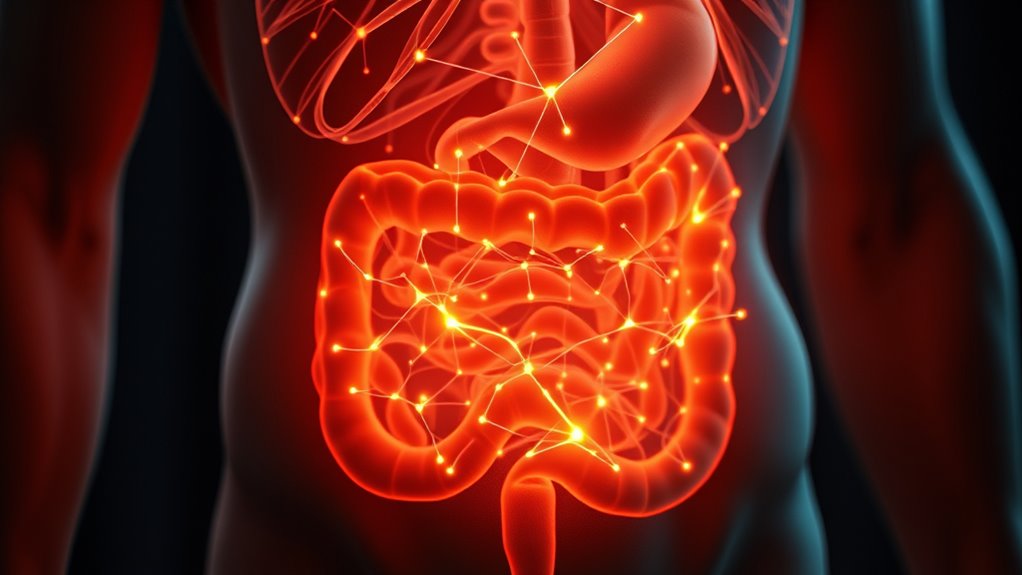Neuroscience shows that gut feelings stem from complex interactions between your brain and body, especially via the gut-brain axis. This system allows your nervous, endocrine, and immune systems to communicate constantly, sending emotional and visceral signals that influence your decisions. Your brain regions like the amygdala and insula process these emotional cues, helping you instinctively gauge right or wrong. By understanding these processes, you’ll uncover how emotion shapes your choices and how you can improve this intuitive ability.
Key Takeaways
- Neuroscience reveals gut feelings originate from brain-body interactions via the gut-brain axis, involving nervous, endocrine, and immune communication.
- Brain regions like the amygdala and insula evaluate emotional signals linked to gut sensations during decision-making.
- The gut-brain axis enables rapid feedback, allowing emotions and bodily signals to influence choices before conscious thought.
- Emotional memories and bodily signals are integrated, guiding decisions based on visceral sensations of right or wrong.
- Enhancing emotional regulation can improve the accuracy and effectiveness of gut-based decision-making.

Have you ever trusted your gut instinct and wondered why it feels so powerful? That sensation, often called a “gut feeling,” isn’t just a metaphor — it’s rooted in your brain and body working together through complex processes. Neuroscience reveals that your gut feelings are closely linked to emotional processing, which plays a vital role in decision-making strategies. When you face a choice, your brain doesn’t just analyze facts; it taps into emotional memories and bodily signals, guiding you toward a decision that feels right on a visceral level.
Your gut and brain communicate through a network known as the gut-brain axis. This bidirectional system connects your nervous system, endocrine system, and immune system, allowing constant dialogue between your brain and your digestive tract. When you encounter a situation that triggers emotional processing, your gut responds by releasing neurotransmitters and hormones that influence how you feel about that situation. This feedback loop helps your brain quickly assess whether a decision aligns with your past experiences and emotional states, often before your conscious mind even steps in.
In terms of decision-making strategies, your gut feelings serve as an intuitive shortcut. Instead of overanalyzing every detail, your brain leverages emotional cues stored in your subconscious to guide you. For example, if a new opportunity makes you feel uneasy, your gut may signal discomfort, prompting you to reconsider or proceed with caution. Conversely, a sense of enthusiasm or calm might encourage you to move forward. This process isn’t about ignoring rational thought but rather integrating emotional processing into your decision framework, making your choices more aligned with your values and well-being.
Neuroscience also shows that certain brain regions, like the amygdala and insula, are key players in processing emotional signals related to gut feelings. These areas evaluate the significance of emotional cues and influence decision-making strategies by filtering incoming information based on emotional relevance. When your brain detects a threat or opportunity, these regions help determine whether to trust your instincts or seek more information. Over time, your brain learns to prioritize these signals, refining your ability to rely on gut feelings for quick, effective decisions. Additionally, research indicates that the gut’s influence on emotions can be strengthened through emotional regulation techniques, which can enhance decision-making accuracy.
Frequently Asked Questions
Can Gut Feelings Predict Future Decisions Accurately?
Gut feelings can sometimes predict future decisions accurately through intuitive decision making. You often rely on subconscious cues your brain processes rapidly, guiding your choices without conscious awareness. While these feelings can be helpful, they’re not foolproof. Recognizing when your intuition is based on genuine signals versus biases is key. Trust your gut, but also weigh rational thoughts to make well-informed decisions.
How Do Gut Feelings Influence Mental Health Disorders?
Imagine your gut as a compass guiding your emotional recognition and decision-making processes. When gut feelings are misaligned, they can deepen mental health disorders like anxiety or depression, acting like stormy seas that distort your internal map. These intuitive signals influence how you interpret emotions, sometimes leading you astray. Understanding this connection helps you navigate mental health challenges more consciously, fostering resilience through better awareness of your body’s subtle messages.
Are Gut Feelings Reliable Across Different Cultures?
You might wonder if gut feelings are reliable across cultures. Cultural differences shape how people interpret and trust these instincts, influencing emotional intelligence. In some cultures, gut feelings are highly valued and trusted, while others may prioritize logic over intuition. Recognizing these differences helps you understand that gut feelings can vary in reliability depending on cultural context, but developing emotional intelligence allows you to better interpret and trust your instincts across diverse settings.
What Role Does Gut Microbiota Play in Intuition?
Think of your gut microbiota as an orchestra, with each microbial member playing a crucial role. These microbes communicate through microbiome communication, influencing your intuition. They send signals via neural pathways to your brain, shaping your gut feelings. When this communication harmonizes well, your intuition becomes sharper. So, your microbiome acts like a backstage crew, quietly guiding your instincts and helping you make quick, confident decisions.
Can Training Improve the Accuracy of Gut-Based Instincts?
Training can definitely improve your gut-based instincts by strengthening your mind-body connection and emotional intelligence. When you practice mindfulness, listen to your body’s signals, and develop emotional awareness, you become more attuned to subtle cues from your gut. This heightened sensitivity helps your intuition become more accurate over time, allowing you to make better decisions based on your instincts. Consistent practice enhances your ability to trust and interpret your gut feelings effectively.
Conclusion
So, next time your gut whispers a warning or guides your choice, remember it’s not just a feeling—it’s a symphony of neurons and signals working behind the scenes. Your gut is like an ancient oracle, wired with wisdom rooted in neuroscience. Trust that silent voice inside, for it’s not just a hunch, but a complex dance of biology informing your deepest instincts. Embrace your gut’s voice—you’re listening to your brain’s beautifully intricate story.









